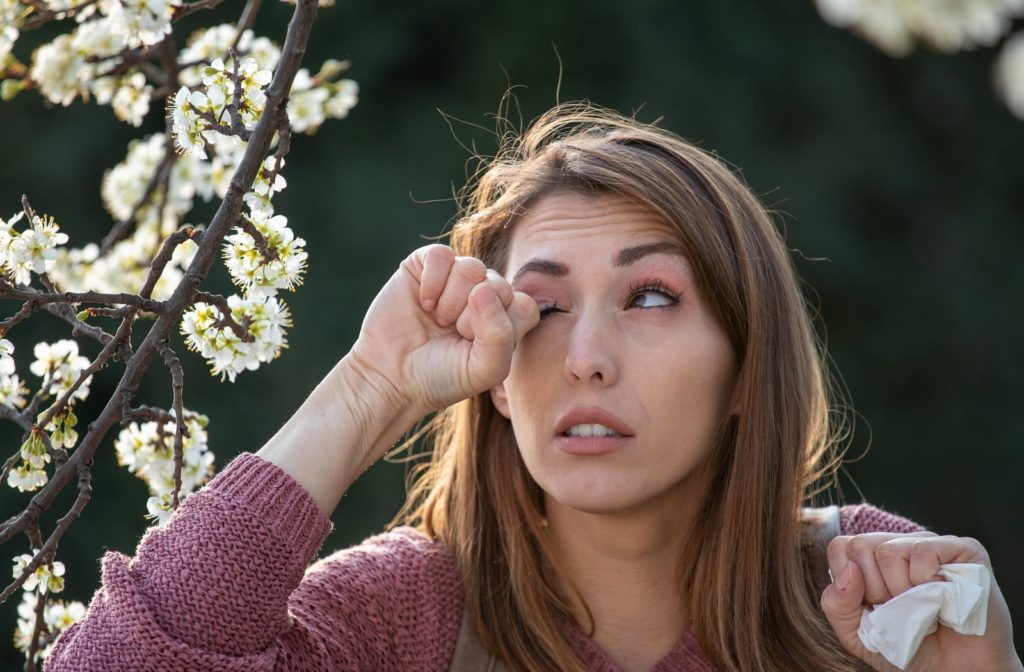The feeling of something being stuck in your eye is especially annoying. But what do you do if there’s nothing actually in your eye?
It could be a sign of seasonal or perennial ocular allergies.
Ocular allergies can affect anyone and can make daily activities uncomfortable and frustrating. Fortunately, there are many ways to manage your allergies and enjoy your life all year round.
What Is an Ocular Allergy?
An ocular allergy, or an “eye allergy”, is usually an inflammatory reaction of the eye’s surface to allergens (particles) in the environment. Eye allergies can affect anyone and occur in varying degrees depending on the person.
There are 5 types of eye allergies:
- Seasonal allergic conjunctivitis, or hay fever pink-eye, occurs in seasons where environmental allergens are more present (like Spring)
- Perennial allergic conjunctivitis is the same as seasonal allergic conjunctivitis, but occurs all year round
- Giant papillary conjunctivitis (GPC) occurs when allergens attach to the contact lenses & trigger the build of inflammatory cells under the eyelid
- Vernal keratoconjunctivitis (VKC) generally occurs in younger people & in warm climates, causing severe redness, itching, stringy mucus & photophobia
- Atopic keratoconjunctivitis (AKC) occurs in patients with atopic dermatitis with varying degrees of allergic symptoms, the severe presentation having potential sight threatening implications
Because there are different types and degrees of eye allergies, it’s important to understand the symptoms. In most cases, eye allergies are more annoying than anything else. However, in severe cases, ocular allergies can lead to permanent damage causing visual loss.
Some common symptoms of eye allergies include:
- Puffiness
- Itching & burning
- Clear, watery discharge
- Redness in/around the eye
- Dark circles under eye
Eye allergies are often triggered by outdoor allergens (such as pollen), indoor allergens (such as dust or mold), and other irritants (such as cigarette smoke or perfume); it can also be secondary to a chronic underlying health condition such as atopy/eczema/dry skin. An ocular allergy can be diagnosed with your optometrist and a few tests.
Treatment & Prevention
Fortunately, there are many treatments and prevention methods available to help manage ocular allergies.
ACUVUE® Theravision®
ACUVUE® Theravision® contact lenses are the first and only daily disposable lenses that release medication to provide clear vision and allergy relief. These lenses begin working within minutes and relieve symptoms of ocular allergies for up to 12 hours.
ACUVUE® Theravision® contact lenses are daily disposable lenses, meaning once you take them out for the day, you should dispose of them. This makes care and maintenance extremely easy. These lenses are also free of preservatives.
These contact lenses are convenient, offer continuous wear through allergy season, and provide consistent relief of allergy symptoms. Learn more about ACUVUE® Theravision® by contacting our team.
Sunglasses
Wearing sunglasses outside can be particularly effective in minimizing your allergy symptoms. Glasses work in the same capacity, but sunglasses are optimal for outdoor activities.
Not only do sunglasses protect your eyes from harmful UV rays (sunlight), but they also prevent allergens and irritants from getting into your eyes.
Over-The-Counter Remedies
You can also get temporary relief from your symptoms with some over-the-counter remedies. Some of these include:
- Artificial tears, especially ectoine containing eye drops
- Decongestant eyedrops
- Oral antihistamines
These over-the-counter solutions can be beneficial, but sometimes they may make your symptoms worse. For example, some oral antihistamines can actually cause dry eye, exacerbating the ocular allergies. It completely depends on the person using them.
Be aware of how your body reacts and if the over-the-counter medication doesn’t work for you, stop taking it.
Prescriptions
For people with more severe allergies, there are prescription medications available to help alleviate their allergy symptoms. You will need a doctor to prescribe these medications for you before you can access them:
- Allergy shots (immunotherapy)
- Non-sedating oral antihistamines
- Eyedrops (decongestant, antihistamine, mast cell stabilizer, corticosteroid, NSAID)
Talk to your doctor about the right treatment for you and your allergies.
Other Methods
Some other ways to prevent and treat allergies include:
- Closing windows during high pollen periods
- Using “mite-proof” bedding
- Avoiding rubbing your eyes
- Cleaning floors with a mop or damp cloth (instead of sweeping)
- Getting a dehumidifier to control mold
- Washing your hands frequently, especially after petting any animals
- Staying inside when pollen is at a peak (midmorning & early evening)
- Avoiding window fans that can pull allergens into the home
- Cleaning your air conditioner regularly
- Washing your clothes after being around animals or outside
- Closing bedroom vents
- Replacing carpet with hardwood, laminate, or tile
Many allergens are airborne, so it can be difficult to avoid them altogether. However, you can put strategies in place to help reduce the impact these allergens have on you.
Live Comfortably Today
Ocular allergies shouldn’t stop you from enjoying your life. Whether you struggle with seasonal or perennial allergies, we’re here to help. Contact us today to learn more about treatment options that work for you.



